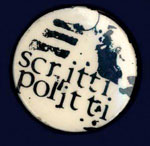Shop Around … pt 8

In a strangely similar way I have been carrying round Scritti Politti’s 'Skank Bloc Bologna' around in my head for goodness knows how long. It’s that catchy. This opening statement of intent from that immediate period after punk where the real underground bursts of creativity took place. It’s one of the great pop performances, and has at last been made available as part of the Early collection on Rough Trade which brings together the great Scritti releases.
It’s a collection of what seemed to me at the time perfectly possible and plausible pop. Now it can be seen as a mad mix of dub, very traditional English avant garde/abstract art rock, and political/art theory cut up in a climate when you could get away with most things.
The CD collection itself provides little context of Scritti in the late ‘70s and into the early ‘80s, so seek out pieces elsewhere like Simon Reynolds’ Scritti epiphany piece for The Wire which are readily available. In reviews attention has been focused on how Scritti then contributed to the demystification of the pop process by outlining the means of producing a record. Great. It was important, and I remember well the way fanzines like Jamming! and other groups like the TVPs played their part.
The funny thing is that in so doing Scritti unwittingly remystified pop. For the kids of 14 through to 18 like me hearing Scritti on Peel and reading about them through journalists like Ian Penman, the world of Scritti seemed like a secret cabal. A cabal that made us outsiders felt totally inadequate and unable to even begin to understand all the political/theoretical references. Gramsci? Did Gram Parsons ski? It was totally and infuriatingly baffling, and all the more attractive for that very reason.
And then there were musical and closer cultural references, like Robert Wyatt and Henry Cow and whatever, which all sounded vaguely hippy. But then the Scritti squat scene all seemed quite hippy-ish, with the white rasta thing, and records that sounded like Anthony Newley impersonating Althea and Donna, and the oh-so-rebellious mess-thetics of the revolt into squalor. Which to someone discovering Pete Meaden’s clean living in difficult circumstances mod philosophy smacked of middle class scum revelling in self-obsessed passivity.
From a distance now, understanding much more of the pop politics, this whole period is one of the funniest. There is a sense of all these post-punk cliques competing, almost like the sects in Monty Python’s Life Of Brian. There’s the Scritti sect squatting in Carol Street, arguing with Camden’s London Musicians Collective, and with arch rival Mayo Thompson’s Red Crayola who seemed a little closer to the Art/Language clique than Scritti thought right. And in South London there was This Heat over in the south London Brixton/Camberwell hinterlands, whose guitar sound Scritti would appropriate. Of course the real Rough Trade home was out west with the Raincoats, Essential Logic, and then really way out west in Bristol was the Pop Group who were cool in the way Scritti could never be.
Actually the whole thing is probably closer to Tony Hancock’s Rebel which mercifully mocks the art world, and it’s easy to add post-punk characters citing thee most obscure Marxist texts, and endlessly debating how revolutionary a statement it is to hang a teabag on your wall.
As absurd as Scritti Politti may seem, there’s no denying that the “early” collection stakes a strong claim as one of the best pop sets ever. It’s one that shouldn’t be listened to in isolation. The aforementioned Red Crayola, Essential Logic, Raincoats, This Heat and Raincoats are up there too. But I’m going to take a deep breath now and say that what makes the Scritti sound so special is the guitar sound. It’s one that clangs and needles and harks back to old reggae records and funk ones and the Velvets and the electric Miles. Subway Sect did it better, and they had better clothes and haircuts too. But life’s not perfect.
© 2005 John Carney